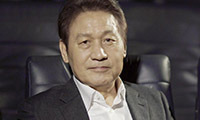Staff Reporter
South Korean and Japanese coast guards Thursday ended their 30-hour maritime standoff over a South Korean fishing boat that briefly crossed into Japanese territorial waters the previous day.
After marathon negotiations over the control of the fishing boat, the ``Shinpung-ho,’’ Japan agreed to withdraw its patrol boats, while South Korea agreed to investigate the charges against the boat, said Lee Kyu-hyung, spokesman for the Ministry of Foreign Affairs and Trade.
``Japan conceded jurisdiction of the Shinpung-ho to us after we said we would investigate the case under our legal system,’’ another senior government official told reporters on condition of anonymity.
He said the boat’s owner had to sign a written guarantee that he will pay Japan 500,000 yen (4.6 million won) as a deposit for fines to be levied if its crew is formally found guilty of noncompliance with inspection and flight. ``The captain and crewmembers will be punished under Korean laws if any wrongdoing is found.’’
The Shinpung-ho, a 77-ton eel-fishing boat, was allegedly spotted inside Japan’s 200-nautical mile exclusive economic zone (EEZ) early Wednesday morning. But the boat fled to the Korean EEZ with two Japanese maritime policemen who had boarded the ship to arrest them.
It is not a problem, according to experts, if the South Korean ship had simply entered the Japanese EEZ as the area is open sea. But it matters if the ship was fishing in that spot. Japan failed to present evidence against Shinpung-ho’s denial.
Patrol boats from the two countries were moored on either side of the fishing boat in international waters as negotiations went on until yesterday morning. Each side demanded the other withdraw so the boat could be towed back to their respective side.
The standoff came just a week after Seoul demanded an apology from Tokyo over a senior Japanese official’s comment that Japan was reluctant to share information about North Korea because the United States did not fully trust South Korea.
President Roh Moo-hyun expressed concern earlier in the day that the two-day confrontation might even chill the atmosphere of the scheduled summit meeting with the Japanese Prime Minister in Seoul.
``In the course of negotiations, caution should be exercised by both sides so as not to confront each other emotionally,’’ Roh was quoted as saying by presidential spokesman Kim Man-soo. ``The incident should be resolved rationally, with the sovereignty of both sides respected.’’
Right after the incident occurred, Minister of Foreign Affairs and Trade Ban Ki-moon met Japanese Senior Vice Foreign Minister Ichiro Aisawa and demanded the Japanese patrol boats be withdrawn from the area, warning the standoff could undermine bilateral ties.
Complying with South Korea’s calls for future-oriented relations, Japan has extended apologies several times for its colonization of the Korean Peninsula (1910-45) and other wartime atrocities in the early 20th century.
But improper remarks by some rightwing Japanese leaders have regularly hindered bilateral relations. Koizumi, since inauguration as prime minister, makes it a rule to pay annual visits to the Yasukuni Shrine, where Japanese war criminals are honored.
South Korea and Japan were set to hold a variety of festivities this year to mark the 40th anniversary of the normalization of diplomatic ties. But, a series of provocative moves by Japan, including its claim on the South Korean-held Dokdo islets and the distortion of history textbooks, stirred public anger, leaving relations strained.
jinryu@koreatimes.co.kr
스마터리빙
more [ 건강]
[ 건강]이제 혈관 건강도 챙기자!
[현대해운]우리 눈에 보이지 않기 때문에 혈관 건강을 챙기는 것은 결코 쉽지 않은데요. 여러분은 혈관 건강을 유지하기 위해 어떤 노력을 하시나요?
 [ 건강]
[ 건강]내 몸이 건강해지는 과일궁합
 [ 라이프]
[ 라이프]벌레야 물럿거라! 천연 해충제 만들기
 [ 건강]
[ 건강]혈압 낮추는데 좋은 식품
[현대해운]혈관 건강은 주로 노화가 진행되면서 지켜야 할 문제라고 인식되어 왔습니다. 최근 생활 패턴과 식생활의 변화로 혈관의 노화 진행이 빨라지고
카테고리 최신기사
- 4기 폐암 치료
- “황희찬 시즌 최고의 퍼포먼스” 극찬, 웨스트햄전 1골·1도움 폭발... 울버햄프턴 ‘EPL 20경기 만에 감격 첫 승’
- “홍명보호 32강은 가지만 16강은 쉽지 않다” 전문가들 전망 [2026 도전 월드컵]
- ‘김민재 직접 모든 러브콜 거절’ 겨울 이적은 없다, 월드컵까진 뮌헨 잔류
- 한국, 북중미 월드컵서 원정 8강 도전… ‘손흥민 라스트댄스’
- ‘메시보다는 손흥민과...’ 美 전역 SON에 푹 빠졌다! 무려 500명 대상 ‘가장 뛰고 싶은 팀’ LAFC 선정
- 미국·캐나다·멕시코, 2026 북중미 월드컵의 모든 것… ‘축구 대제전’ 전 세계 이목 미국으로
사람·사람들
more많이 본 기사
- 세계 곳곳서 ‘美규탄’ 시위…마두로 아들 “거리로 나와달라”
- 美 ‘유령 특수부대’ 델타포스
- 베네수엘라, 세계 최대 매장량이라는데…국제유가도 영향받나
- ‘국민 배우’ 안성기 별세…69년 연기 인생 마침표
- 美, 베네수 부통령에 압박 “마두로와 다른 선택하길”
- [美 마두로 축출] 마두로 베네수엘라 대통령, 5일 법정 첫 출석
- 코미디부터 예술영화까지… ‘천의 얼굴’로 스크린 누빈 안성기
- 이부진 호텔신라 사장 NBA 중계화면에…아들과 함께 미국서 휴가
- 故김영인 누구?..故송도순 이어 별세, 슬픔에 빠진 방송계
- [CES 2026] 6억달러 새단장한 우아한 전시장…내부엔 지게차 동원 개막준비
- 아이유♥변우석·지성·신하균·유연석.. ‘2026 MBC 연기대상’ 벌써 치열하다
- 美, 직접통치아닌 압박통한 정책개입 가닥… “함포외교”
- [美 마두로 축출] 뉴욕 구치소 수감된 마두로… “좋은 밤이에요” 인사도
- 여야 새해도 극한대치… ‘종합·통일교특검’ 법사위 첫 戰場 예고
- [美 마두로 축출] 미 곳곳서 반전시… 1
- 젤렌스키 “이달 내로 종전안 놓고 美 정상회의 희망”
- 임재범, 은퇴 발표 “박수칠 때 떠나겠다”
- 20kg 빼고 아이돌 외모 되찾더니..강남, 기안84와 북극 마라톤 도전
- [CES 2026] 우유 꺼내고 수건 개는 로봇…LG ‘가사 해방’ 속도
- 李대통령 “中, 한반도 평화 파트너…… 1
- 영종도 인천공항 잇는 3번째 다리 내일 개통…요금 2천원
- 국힘에 ‘살려달라’고 문자 메시지?…이혜훈측 “전혀 사실 아냐”
- [美 마두로 축출] 트럼프 ‘서반구 패권’ 구상 본격화하나…중남미 긴장 고조
- 美 경제석학 “韓 원화가치 매우 저평가…향후 회복할 것”
- [美 마두로 축출] 한밤 안가 급습 ‘확고한 결의’ 작전… “침실서 끌어내”
- ‘연프 중독’ 고준희, 눈 성형 고백에 풍자 “과연 눈만 했을까?” 의심
- [美 마두로 축출] 트럼프, 두번째 중대 군사작전…北이 받을 메시지는
- 北, 탄도미사일 발사… ‘마두로 축출’ 파장 속 무력시위
- [美 마두로 축출] 갈라진 지구촌…쏟… 1
- 김병기, 경찰에 줄고발… ‘아들 취업청탁·편입시도’ 진술도
- [美 마두로 축출] 루비오 국무장관, 베네수 부통령에 “마두로와 다른 선택하길”
- [美 마두로 축출] 트럼프 “베네수엘라 부통령이 잘하면 미군 주둔 안해”
- “韓 독립혼 상징”…재조명되는 현대차그룹 상하이 임정 보존활동
- ‘종합선수권 10연패’ 차준환, 3연속 올림픽행 “꿈의 무대... 모든 것 보여주고 오겠다”
- ‘에릭♥’ 나혜미, 두 아들과 일상 공개..짱구 볼살+붕어빵 눈매 “우리 강아지들”
- “황희찬 시즌 최고의 퍼포먼스” 극찬, 웨스트햄전 1골·1도움 폭발... 울버햄프턴 ‘EPL 20경기 만에 감격 첫 승’
- [美 마두로 축출] 체포된 마두로 부부, 뉴욕 도착…다음주 재판받을 전망
- BBC “입소문서 시작한 K-뷰티, 전세계 스킨케어 루틴으로”
- [美 마두로 축출] 서반구·마약·석유…트럼프 작전배경의 세 키워드
- 해넘긴 미중정상회담 합의문 발표…무역합의 불확실성↑
- [美 마두로 축출] 트럼프 “베네수엘라 부통령이 잘하면 미군 주둔 안해”
- [美 마두로 축출] 유엔 안보리, 5일 긴급회의…베네수 소집요청
- ‘왕따 주행 논란’ 억울함 푼 김보름 “말로 담기 어려운 시간 지나...” 현역 은퇴 선언
- 李대통령, 오늘 국빈 방중 출국…비핵화·한한령 ‘돌파구’ 주목
- 슈 “임효성과 부부 싸움..연락처 차단·집 비밀번호 바꿔”
- ‘밀라노행 확실시’ 피겨 차준환, 올림픽 2차 선발전 쇼트 1위... 프리 스케이팅 예정
- 美, 마두로 전격 체포·압송…트럼프 “정권이양까지 베네수 통치”
- [美 베네수 공격] 유엔총장 “국제법… 1
- 中관영매체 “李대통령 중요시점 방중…… 1
- 트럼프 “안전한 정권이양 때까지 미국이 베네수엘라 통치”(종합)
1/5지식톡

-
 미 육군 사관학교 West Poin…
0
미 육군 사관학교 West Poin…
0https://youtu.be/SxD8cEhNV6Q연락처:wpkapca@gmail.comJohn Choi: 714-716-6414West Point 합격증을 받으셨나요?미 육군사관학교 West Point 학부모 모…
-
 ☝️해외에서도 가능한 한국어 선생님…
0
☝️해외에서도 가능한 한국어 선생님…
0이 영상 하나면 충분합니다!♥️상담신청문의♥️☝️ 문의 폭주로 '선착순 상담'만 진행합니다.☎️ : 02-6213-9094✨카카오톡ID : @GOODEDU77 (@골뱅이 꼭 붙여주셔야합니다…
-
 테슬라 자동차 시트커버 장착
0
테슬라 자동차 시트커버 장착
0테슬라 시트커버, 사놓고 아직 못 씌우셨죠?장착이 생각보다 쉽지 않습니다.20년 경력 전문가에게 맡기세요 — 깔끔하고 딱 맞게 장착해드립니다!장착비용:앞좌석: $40뒷좌석: $60앞·뒷좌석 …
-
 식당용 부탄가스
0
식당용 부탄가스
0식당용 부탄가스 홀세일 합니다 로스앤젤레스 다운타운 픽업 가능 안녕 하세요?강아지 & 고양이 모든 애완동물 / 반려동물 식품 & 모든 애완동물/반려동물 관련 제품들 전문적으로 홀세일/취급하는 회사 입니다 100% …
-
 ACSL 국제 컴퓨터 과학 대회, …
0
ACSL 국제 컴퓨터 과학 대회, …
0웹사이트 : www.eduspot.co.kr 카카오톡 상담하기 : https://pf.kakao.com/_BEQWxb블로그 : https://blog.naver.com/eduspotmain안녕하세요, 에듀스팟입니다…
케이타운 1번가
오피니언
 손영아 문화 칼럼니스트 / YASMA7 대표
손영아 문화 칼럼니스트 / YASMA7 대표 [손영아의 문화산책] ‘슈만의 연가’… 170년 전 멈춘 시간, 끝나지 않은 사랑
 김재천 서강대 국제대학원 교수
김재천 서강대 국제대학원 교수 [김재천 칼럼] 2026년, 미·중 대타협은 가능할까
 조지 F·윌 워싱턴포스트 칼럼니스트
조지 F·윌 워싱턴포스트 칼럼니스트 [조지 F. 윌 칼럼] AI 투자 붐이 걱정된다면?… 역사적 맥락을 보라
 이희숙 시인·수필가
이희숙 시인·수필가 [금요단상] 차가운 길, 이불 한 장의 온기
 한영일 / 서울경제 논설위원
한영일 / 서울경제 논설위원 [만화경] 33년만에 퇴역하는 장보고함

[왈가 왈부] 이혜훈 ‘정말 널 죽였으면’ 폭언, 장관직 수행 가능할까요
 정숙희 논설위원
정숙희 논설위원샴페인, 마지막 날과 첫날을 위하여
 조지 F·윌 워싱턴포스트 칼럼니스트
조지 F·윌 워싱턴포스트 칼럼니스트 [조지 F. 윌 칼럼] 저무는 2025년에 안도의 한숨
 김동찬 시민참여센터 대표
김동찬 시민참여센터 대표 [미국은 지금] 책임 있는 자본 없으면 커뮤니티 미래도 없다
1/3지사별 뉴스

뉴욕시 첫 무슬림 시장 맘다니 취임
미국 최대도시이자 경제 수도로 꼽히는 뉴욕시의 첫 무슬림·남아시아계 시장이자 스스로를 민주사회주의자라고 부르는 조란 맘다니 신임 뉴욕시장이 새…
뉴욕시민 기대수명 82.6세⋯팬데믹 이전 회복

건국 250주년 워싱턴 모뉴먼트 라잇쇼
워싱턴 DC 내셔널 몰 중심에 위치한 워싱턴 모뉴먼트(Washington Monument)가 화려한 불빛으로 장식됐다. 지난 31일 새해 카운…
“소확행<작지만 확실한 행복> 즐겨요”

[美 마두로 축출] 트럼프 “베네수엘라 부통령이 잘하면 미군 주둔 안해”
도널드 트럼프 대통령은 베네수엘라 측이 미국이 바라는 대로 행동하는 한 미군이 베네수엘라에 주둔하지 않을 것이라고 말했다고 뉴욕포스트가 3일 …
중부 캘리포니아 ‘한인 이민사’ 나왔다
오늘 하루 이 창 열지 않음 닫기 




















































.png)


댓글 안에 당신의 성숙함도 담아 주세요.
'오늘의 한마디'는 기사에 대하여 자신의 생각을 말하고 남의 생각을 들으며 서로 다양한 의견을 나누는 공간입니다. 그러나 간혹 불건전한 내용을 올리시는 분들이 계셔서 건전한 인터넷문화 정착을 위해 아래와 같은 운영원칙을 적용합니다.
자체 모니터링을 통해 아래에 해당하는 내용이 포함된 댓글이 발견되면 예고없이 삭제 조치를 하겠습니다.
불건전한 댓글을 올리거나, 이름에 비속어 및 상대방의 불쾌감을 주는 단어를 사용, 유명인 또는 특정 일반인을 사칭하는 경우 이용에 대한 차단 제재를 받을 수 있습니다. 차단될 경우, 일주일간 댓글을 달수 없게 됩니다.
명예훼손, 개인정보 유출, 욕설 등 법률에 위반되는 댓글은 관계 법령에 의거 민형사상 처벌을 받을 수 있으니 이용에 주의를 부탁드립니다.
Close
x